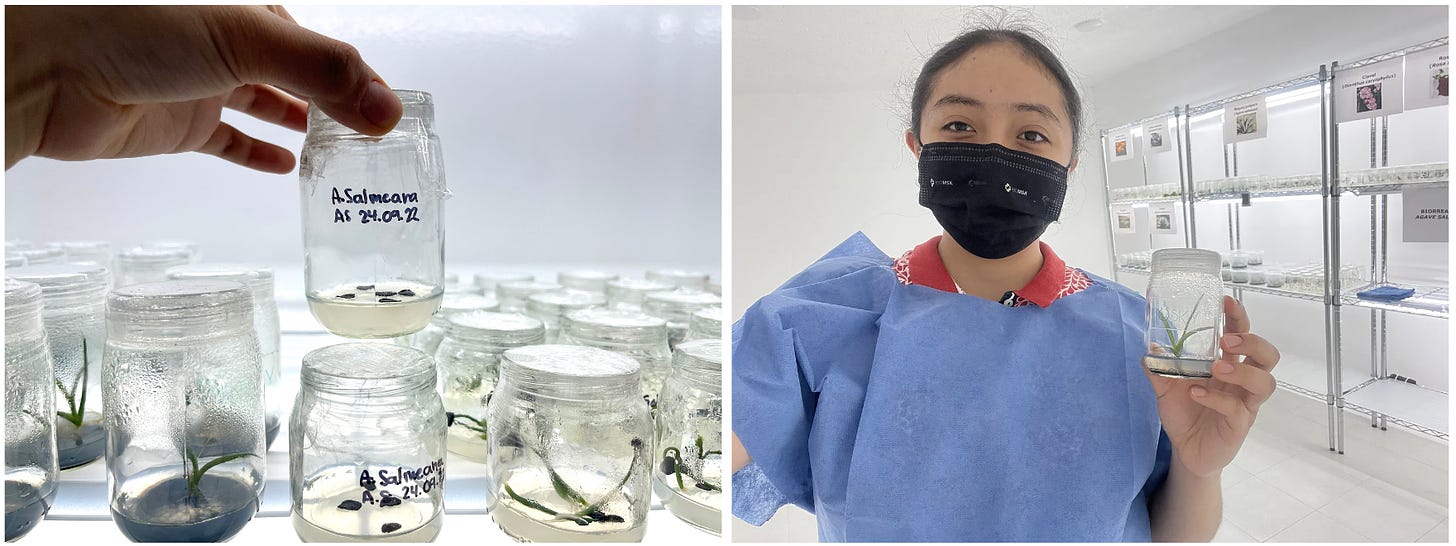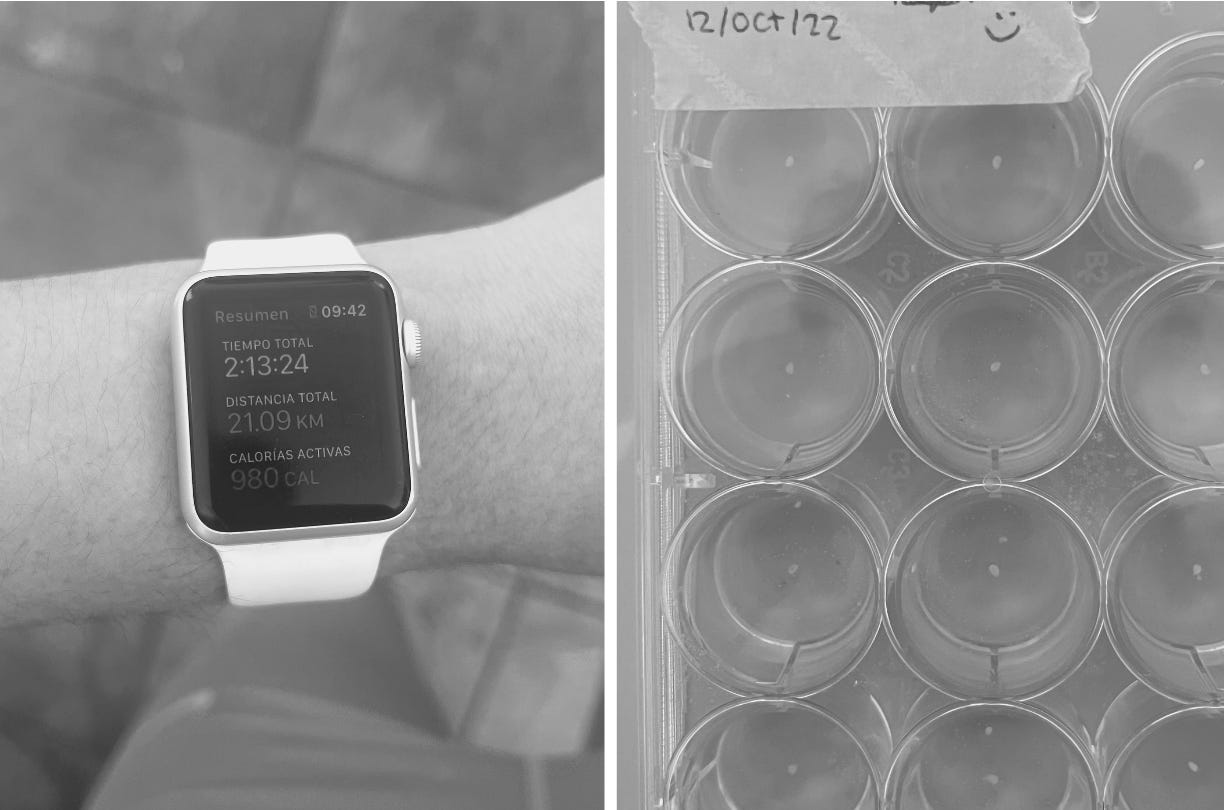Dawn, the first chapter of Shoe Dog, is one of my favorite readings ever. Phil Knight makes such an elegant description of what he feels when he’s running, how he used to think about his Crazy Idea (better known as Nike today) while running and how he merged both, literally and figuratively.
Writing this post made me realize how easily ‘romanticizable’ the ideas of running both companies and tracks are, how easier it is for me to write than to do, and that the reason why Shoe Dog is great not because of the inspiring first chapter but because of the story that comes in subsequent pages: the vulnerable moments, the effort, and the wins of a now world class company.
That said, my intention here is to reflect on what I’ve learned from running over the last 2 years and what I’ve learned after 1 year of working on Labmade, a project to grow cotton 10x faster while using ~80% less water and land than any other method.
1. Just do it
I wasn’t ‘born to run’. Sports class was the thing I hated the most every day of middle school–yeah, I was that girl. That girl, who only after reading David Sinclair’s Lifespan book would start running a few kilometers in spring of 2020. Boy, using miles in plural is a hyperbole. I was running about 1 K and taking breaks in between.
In retrospect, the first trait that athletes and doers have in common is initiative; a bias towards action. For audacious their goals can be, they have the courage to start somewhere and do so promptly.
I was recently listening to a podcast episode with Millán Ludeña, one of only 13 people in the world who have ran >100 K in the coldest and hottest places on Earth. His favorite moment in life is ‘that crack’ when you decide you’re gonna do something, after having that bugging idea in your mind and not telling anyone about it because you think it’s nuts.
2. Find a coach
In the summer of 2021, my Crazy Idea was growing cotton through cellular agriculture. The fact that the method to do so has been here for decades was both relieving and scary. For months, the bugging question in my mind was “why is nobody growing cotton this way?!?!?!” (meaning nobody in industry).
To my fortune, people in cellAg had asked themselves that same question in relation to meat. It turns out that when it comes to growing cells, nature still does it cheaper and easier. Shoutout to Steve Rees (CEO of Defined Bioscience) who provided me with perspective on this and introduced me to people from New Harvest. Shoutout to them for supporting me in making this happen 🙏.
My local uni lab hadn’t opened yet due to pandemic regulations but waiting was not an option. Experimenting at my high school’s lab and at home grew in me a mad respect for biohackers, taught me that you can try to replace expensive equipment like autoclaves and fume hoods for express pots and alcohol lamps, and showed me that working at a proper biotech lab is sometimes just easier.
The very second week of 2022, the director of my local uni lab said I could work there on my project… but she didn’t quite say I’d have to wait 11 months. Academia is slow and I’m impatient so I found a PhD student who’s answered the questions Google can’t and taught me how to do more legit plant tissue culture.
I realized many of the things I didn’t know I didn’t know (like the importance of sterility 😂). The most important lesson is that while most people can run alone, those who strive for world class performance seek constant coaching from someone who’s trained for and ran a similar race.
3. Keep running your race
Over 20 unsuccessful cotton experiments later, I’ve started to question the reproducibility of science 🤨. Like, people!!! I’ve been following the same protocol for months, I don’t know what’s going onnn!!
Okay, there must be tons of things I can improve on my execution so I’ll keep asking questions on SciFind—shoutout Guy for building it. Definitely check it out if you’re someone somewhere building with biology ;)
On the wins side, Labmade has been Mexico’s finalist for the Earthshot Prize (founded by Prince William :O), it was one of 5 projects to win New Harvest’s global cellular agriculture challenge, got me a 70% scholarship to study at Mexico’s top university and gained attention from people who work at multinational fashion brands.
Sure, those things are good for social validation but they’re not my destination. Knight reminds us that running doesn’t make any sense outside the runner’s mind. In startups and life too, only you can define the destination and it’s crucial for you keep it in mind or redefine it unless you want to pay the high cost of indecision.
The moment I truly act like we all are running a different race, I will stop caring about how fast others are running, what gems they’ve found on their way, what obstacles they have or haven’t faced or how fancy the roads they’re running on may be. I will just keep running, focus on bridging the gap between here and my goal and thus, increase the chances of getting there in time.
Today I ran my first half marathon. Looking back, it literally took hundreds of attempts to get there. Running has taught me that passion is what you keep doing despite constant failure.
I’ve accepted that lab-grown cotton is an ultra-marathon, one that I want to run. I’m becoming more patient I’m making smarter moves. I’ll keep running. Would you like to come along?









Dale, Sofi!!
Lo lograrás mientras no te convenzas de que eres mejor de lo que realmente eres a lo largo de tu aventura. (Mi mentor de startup me lo dijo)
Sofi, you will get it!!